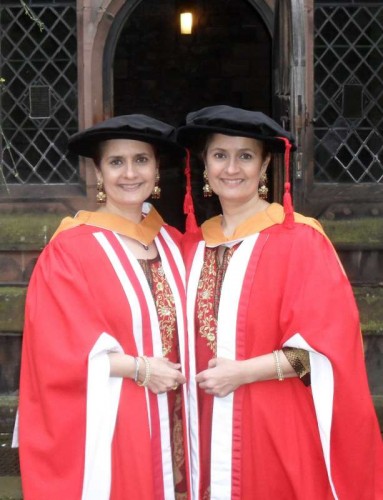The Singh Twins after being conferred with their Honorary Doctorates of Fine Art, outside Chester Cathedral…writes Asian Lite, UK’s No 1 newspaper for British Asians

Acclaimed British artists, The Singh Twins, whose work as young art students was dismissed by their tutors as “backward, outdated and having no place in modern art” because it was rooted in a traditional Indian art form, have been awarded Honorary Doctorates from the University of Chester in recognition of their “Outstanding contribution to British art”.
Other recent recipients of Honorary Degrees from the University of Chester include, HRH the Prince of Wales, former England captain Test cricketer Sir Ian Botham, His Grace the Duke of Westminster, pioneering physicist and astronomer Sir Bernard Lovell, BBC journalist Dame Joan Bakewell and Terry Waite.
In addition to the University of Chester, The Singh Twins’ contribution to British art has been formally recognised by their home city of Liverpool, which made them, honorary citizens in 2010 and at the highest level of the British Establishment when in 2011, they were awarded MBE’s in the Queen’s Birthday Honours list.
The Twin sisters, who attended the University of Chester as Ecclesiastical History, Comparative Religion and 20th Century Western Art History, Bachelor of Arts students back in the mid 80’s, when it was still an affiliated College of Liverpool University, are best known for their pioneering modern development of the Indian miniature style of painting, through which they challenge what they describe as the ‘west is best’ mind set as well as wider issues of social, political and cultural debate.
Speaking about the award, the Singh Twins said: “Given the struggle we have had to gain acceptance for our art within the mainstream, on our own terms – being awarded an Honorary Doctorate in Fine Art for ‘outstanding contribution to British Art’ is not only a special honour but an important, personal, mile stone of recognition and achievement for us in terms of the goal we set ourselves as artists, to challenge the Western Art Establishment’s generally Eurocentric, narrow defining and evaluation of Contemporary Art.”
“It’s the struggles, rather than our successes as artists that make the honour being bestowed on us by the University of Chester, mean more to us than words can adequately express”.
Their acceptance of Honorary Doctorates from Chester comes almost 30 years after they officially rejected the “derisory” grade of BA Hons.
Degrees awarded to them by the University of Liverpool, when an external examiner in art refused to mark their final year dissertations which argued how Indian and other traditional non European art forms has significantly impacted on Western art – despite describing them as “undoubtedly scholarly” and PhD level.
They successfully appealed against the examiner’s refusal to mark their work and went on to do Postgraduate research at Manchester University before finally embarking on a career in art in the late 1990’s. Since then they have achieved success on an international platform.
Before receiving their Honorary Doctorates of Fine Art in the historic Roman City of Chester on March 20th, the London born Twins, who have exhibited internationally and have work in collections worldwide, were invited to join the University’s Vice Chancellor and the Lord Mayor of Chester at the head of a procession through the city, in celebration of the University of Chester’s 175th anniversary this year. Their Honorary Degrees were awarded with full pomp and ceremony in the majestic and awe inspiring surroundings of Chester Cathedral.
Addressing an audience of several hundred new graduates, academics and dignitaries the Twins first congratulated fellow graduates before speaking about their own fond memories of their time at Chester and the positive impact which that experience had on their practice as artists. They then went on to describe both the difficulties they faced as young art students who were pressured to conform to western role models in art, and their ongoing experiences of institutional, cultural prejudice within the art establishment and wider society. They ended, by thanking the University and acknowledging members of their family as well as individuals from the arts and academic world who had supported them in their career over the years. The ceremony was then closed with a fanfare of trumpets.